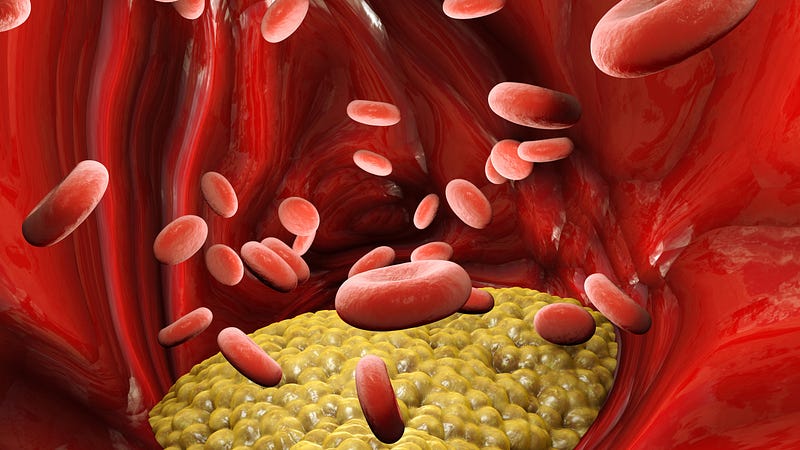 |
| Photo Credit: Delphotostock on Adobe Images |
It is no longer news that low-density lipoprotein (LDL) has been given a bad name. Yes, ever since it was tagged the “bad” cholesterol, LDL has been heavily demonized and accused of contributing to almost every health disorder.
Cardiologists and medical doctors have also campaigned vigorously against LDL, insisting that humans are better off with a low level of this cholesterol in their blood.
However, several studies have challenged this “cholesterol hypothesis” and found that there has been a great exaggeration of statin therapy benefits, and that ‘LDL’ cholesterol is not your enemy per se.
What are the different types of cholesterol?
You see, there are two main types of cholesterol: the good and the bad.
The ‘good’ cholesterol is known as high-density lipoprotein cholesterol, while the ‘bad’ cholesterol is known as low-density lipoprotein cholesterol (HDL and LDL respectively).
It has been hypothesized that LDL cholesterol plays a major role in numerous health conditions, including cardiovascular conditions.
 |
| Photo Credit: Naeblys on Adobe Images |
However, researchers believe that high LDL cholesterol doesn’t really cause much harm as insinuated.
Technically, bad cholesterol is thought to be atherogenic. This means that it promotes fatty plaque formation in the arteries. This explains why statins target LDL.
However, results from current research have found that targeting bad cholesterol may not be good medicine.
What does the research say?
A 2016 study published in the British Medical Journal found that LDL cholesterol may not be so bad after all. Going a step further, researchers have provided the rationale to re-evaluate guidelines for heart health.
The researchers were pulled from seven countries around the world. They evaluated data obtained from 19 studies on over 68,094 adults. The objective of the research was to determine the role of LDL cholesterol in the mortality of older adults.
Well, the cholesterol hypothesis suggests that there should be a direct relationship between LDL cholesterol and death in older adults. But the results from the BMJ study found otherwise.
According to the researchers, over 80% of the participants with high LDL cholesterol did not die due to high cholesterol levels.
Conversely, researchers discovered that there was a high death rate among people with low levels of LDL cholesterol, the major cause of death for both male and female American adults.
The findings from these studies have contradicted the cholesterol hypothesis. The researchers who have themselves published books criticizing this cholesterol hypothesis agree that there has been a great exaggeration of the benefits of statin treatment.
The origin of the cholesterol hypothesis
Experts who have challenged the acclaimed importance or benefits of LDL cholesterol say that we’ve made a lot of wrong measurements.
According to the researchers, cholesterol may not be a direct marker of heart disease. They also say that total cholesterol may not be an accurate metric.
According to the researchers, focusing on triglycerides might be the best way to monitor heart health.
In the 1960s, there was serious controversy over the primary cause of heart disease. One group focused on sugar as the culprit, while the other group insisted that dietary fat, especially saturated fat, was the primary cause.
John Yudkin championed the accusation against sugar, while Ancel Keys suggested that dietary fat was to blame. Yudkin was a British physiologist while Keys was an American scientist.
The battle continued until the 1970s, but then, three major discoveries relegated fat as the primary enemy of heart health.
The first discovery centered around familial hypercholesterolemia, a genetic condition characterized by a lack of LDL receptor in the liver, usually leading to teenage death from a heart attack.
The second discovery was that LDL cholesterol level was raised by dietary fat.
And the third argument was that there was a correlation between high LDL levels and heart disease.
Why Would Your Body Make LDL if It’s ‘Bad’?
The idea that fat was the problem, was welcome. Yudkin’s argument was completely forgotten, and the low-fat theory ruled, completely destroyed our diets, and resulted in the current metabolic syndrome and obesity pandemic.
The truth is that these three discoveries, all of which are not completely true, turned out to be unrelated and irrelevant.
The fact is LDL is not as bad as many think and that you should consider a healthy ketogenic diet full of vegetables. To learn more, read this article that explains ketosis more in detail.
References
Centers for Disease Control and Prevention. Underlying Cause of Death, 1999–2018. CDC WONDER Online Database. Atlanta, GA: Centers for Disease Control and Prevention; 2018. Accessed April 16, 2021.
Diamond DM, Ravnskov U. How statistical deception created the appearance that statins are safe and effective in primary and secondary prevention of cardiovascular disease. Expert Rev Clin Pharmacol 2015; 8:201–10.
Fryar CD, Chen T-C, Li X. Prevalence of uncontrolled risk factors for cardiovascular disease: United States, 1999–2010 pdf icon[PDF-494K]. NCHS data brief, no. 103. Hyattsville, MD: National Center for Health Statistics; 2012. Accessed April 16, 2021.
Ravnskov U, Diamond DM, Hama R, et al. Lack of an association or an inverse association between low-density-lipoprotein cholesterol and mortality in the elderly: a systematic review. BMJ Open 2016;6: e010401. doi: 10.1136/bmjopen-2015–010401